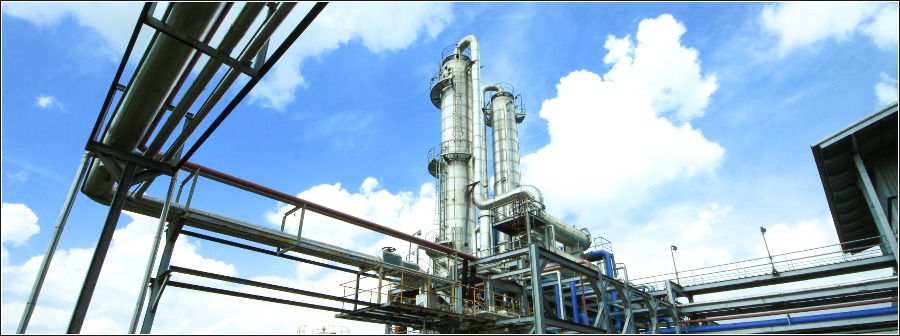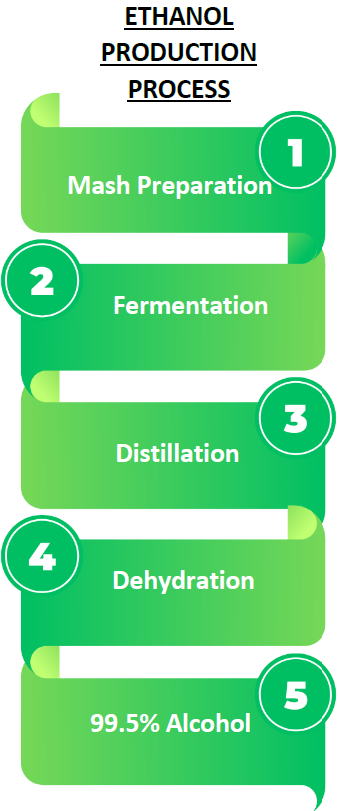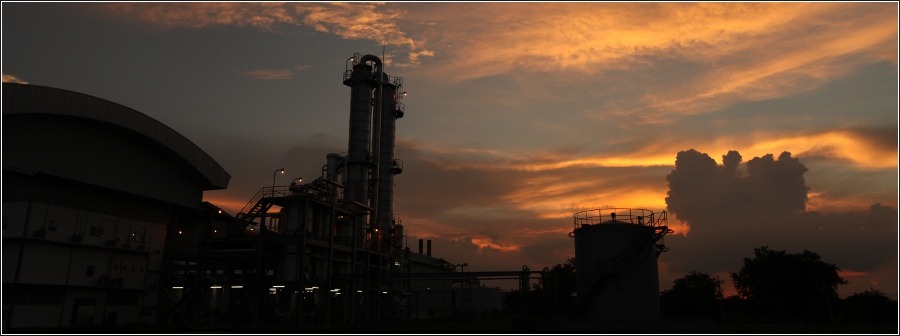The molecular formula of ethanol is C2H5OH with a boiling point at around 78oC. In general, its properties are transparent liquid, colorless, flammable, and high octane fuel, which can be blended with gasoline at an appropriate amount to produce a clean and complete combustible fuel and reduce air pollution with less formation of hydrocarbon compound, carbon monoxide (CO) and carbon dioxide (CO2), which is the main cause of greenhouse effect in the atmosphere.

Production of Ethanol for Fuel
Thai Agro Energy Public Co., Ltd. (“TAE”), a subsidiary company, produces ethanol for fuel by using molasses and cassava as its main raw material. The ethanol production process consists of four main stages as follows:
- Mash Preparation: each type of raw material requires different processes as follows:
(a) Molasses: Preparation of molasses before fermentation by dilution with water for suitable concentration and added with acidic additive, causing organic substance or salt to settle from the molasses solvent, before proceeding to fermentation.
(b) Cassavas: Cassavas are cleaned to eliminate contaminants including metal and dirt. Subsequently, clean cassavas are mashed and mixed with water to make starch paste, then to be digested with enzyme, converting starch to sugar, before proceeding to fermentation. - Fermentation : Solvent from the first stage is fed to fermentation tanks with yeast being added to convert sugar into alcohol.
- Distillation : Fermentation mash from the second stage is fed to the distillation column to separate contaminants and water producing about 96 percent pure alcohol which is the maximum concentration that can be achieved through this normal fermentation process. The remaining 4 percent of water shall be removed by the final stage.
- Dehydration : The water removal process for producing the dehydrated alcohol from the distillation process into 99.5 percent pure alcohol. Water content is absorbed by zeolites molecular sieves in two dehydration units. The dehydrated alcohol will then be distilled and cooled down before being stored for further distribution.

Ethanol Pricing Policy
The Committee on Energy Policy Administration (“CEPA”) approved the use of ethanol reference prices based on the lowest price comparison between the ethanol price reported by producers to the Excise Department and the ethanol price reported by fuel traders under Section 7 of the Fuel Trade Act B.E. 2543 (2000) to the Energy Policy and Planning Office (“EPPO”), with the pricing mechanism has been in effect since December 2015. TAE’s ethanol pricing is based on a cost-plus margin approach, considering various factors, including raw material prices, market supply and demand, and the competitive landscape both domestically and internationally.
Ethanol Sales and Distribution Channels
In compliance with Excise Department regulations, ethanol sold as fuel must undergo a denaturation process, in which ethanol of at least 99.5 percent by volume is mixed with 0.5 percent gasoline or gasohol. The resulting denatured ethanol will be sold to oil companies in accordance with Section 7 of Fuel Trade Act B.E. 2543. Oil merchants use denatured ethanol for blending with gasoline in specific proportions to produce gasohol E10, E20, and E85. While most customers handle ethanol transportation, in some cases, the seller is responsible for delivering it to the customer’s storage facility. Ethanol sales are primarily conducted on a credit term basis, with customers being large oil companies with stable financial status, thereby minimizing the risk of non-payment.
Competitive Strategy
Priority is given to service excellence, product quality control, and ensuring timely product delivery. These strategies enhance customer trust, strengthen relationships, and support market share retention.
Ethanol Industrial Trend
In 2024, average ethanol consumption was at 3.43 million liters per day, which decreased from 2023 by approximately 2.83 percent. This was due to the termination of price subsidies from the state Oil Fund for E20 and E85, effective from November 25, 2022.
Demand for Ethanol-for-Fuel
| Description | (Unit : Million Liters) | |||||
|---|---|---|---|---|---|---|
| Year 2019 | Year 2020 | Year 2021 | Year 2022 | Year 2023 | Year 2024 | |
| Ethanol Consumption Volume | 1,629.90 | 1,519.98 | 1,353.85 | 1,393.60 | 1,288.45 | 1,251.95 |
| Average Daily Ethanol Consumption | 4.43 | 4.00 | 3.71 | 3.83 | 3.53 | 3.43 |
Source: Department of Alternative Energy Development and Efficiency, Ministry of Energy
Gasohol Industrial Trend
The ethanol-for-fuel is blended with gasoline in specific proportions to produce gasohol E10, E20, and E85. Therefore, domestic ethanol demand is directly driven by gasohol consumption. In 2024, national gasohol consumption increased by 0.15 million liters per day, or 0.49 percent, compared to 2023.
Competitive Trend
In 2024, there are 27 operating ethanol plants in Thailand, representing a total capacity of 6,770,000 liters per day.
Market Share of Ethanol Business
| Year | Domestic Ethanol Consumption (Million Liters) |
Denatured Ethanol Sales Volume of TAE (Million Liters) |
Market Share of TAE (%) |
|---|---|---|---|
| 2019 | 1,629.90 | 117.021 | 7.18 |
| 2020 | 1,519.98 | 104.425 | 6.87 |
| 2021 | 1,353.85 | 85.352 | 6.30 |
| 2022 | 1,393.60 | 73.325 | 5.26 |
| 2023 | 1,288.45 | 88.774 | 6.89 |
| 2024 | 1,251.95 | 74.663 | 5.96 |
Remarks:
(1) TAE’s market share in 2024 was 5.96 percent, a decrease of 0.93 percent from 2023.
(2) Source: Department of Alternative Energy Development and Efficiency, Ministry of Energy
FUTURE INVESTMENT PROJECTS
The Company has established a business plan and investment strategy in line with diversification strategy guidelines. However, all development and investment decisions are subject to prudent and careful consideration, ensuring an appropriate diversification of risks to support the Company’s long-term growth with quality, stability, and sustainability. Additionally, the Company places great importance on corporate governance, social responsibility, and environmental sustainability in its business operations. Currently, the Company’s core business is the coal business, with two existing coal mining concessions in Indonesia and an additional third coal mining concession acquired in 2021. The concession periods for these three coal mines extend for more than 10 years, with substantial reserves of high-quality coal, ensuring good revenue and income continuously for a long time into the future. However, the global trend has increasingly shifted from fossil fuels, including oil, natural gas, and coal, which are considered major contributors to greenhouse gas emissions and global warming. As a result, there have been attempts to reduce and replace fossil fuels with renewable energy. Despite this transition, fossil fuels remain the primary energy sources and there are still a lot of limitations for switching to alternative energy or renewable energy for the main energy sources. During this transitional period, fossil fuels, including coal, continue to be necessary for electricity generation and industrial processes, particularly given the growing energy demand in Asia, even though global coal demand is expected to gradually decline in the future. Nonetheless, the Company, with its expertise in the coal business, continues to seek additional investment opportunities in coal concessions in Indonesia to offset the depletion of existing reserves due to continuous coal production and distribution. Furthermore, the Company is also considering investment opportunities in other mineral mining projects to diversify its portfolio.
The Company recognizes the challenges of climate change and places importance on the effective utilization of resources prioritizing environmental responsibility. It is committed to developing sustainable strategies with the goal of achieving carbon neutrality in the near future. The Company has established a plan to create balances in its investments by focusing on future investments in clean and renewable energy businesses, which are environmentally friendly. Accordingly, the Company is actively exploring new business opportunities and investment channels to drive the next phase of growth, or a New S-Curve, by trying to think outside the box from traditional energy business model and adopting a more innovative and creative perspective to develop new non-coal businesses, both in Thailand and overseas, despite not yet having direct expertise in such sectors. The Company is considering various investment approaches, including business takeovers, mergers and acquisitions, and joint venture partnerships, with the objective of finding opportunities or channels for investments in the other businesses to supplement revenue and income from the Company’s existing coal and ethanol businesses, ensuring long-term growth with stability, quality, and sustainability, in line with its established guidelines and objectives.
ETHANOL BUSINESS ACTIVITIES
Thai Agro Energy Public Co., Ltd. (“TAE”), a subsidiary registered in Thailand, in which Lanna Resources Public Co., Ltd. directly holds 51 percent of the paid-up capital, conducts business in the production and distribution of ethanol (99.5% anhydrous alcohol by volume) for bio-fuel purpose. TAE operates two ethanol production plants located in Dan Chang District, Suphanburi Province. Production Line No. 1 has a production capacity of 150,000 liters per day, and the Production Line No. 2 has a production capacity of 200,000 liters per day, totaling 350,000 liters per day, utilizing molasses and cassava as main raw materials. Both ethanol plants have been granted investment privileges under the Investment Promotion Act B.E. 2520. Ethanol is a clean fuel used for blending with gasoline at 10, 20 and 85 percent, creating gasohol known as E10, E20 and E85, which can be used in general automobiles. Additionally, the ordinary shares of TAE have been listed on the Stock Exchange of Thailand since June 5, 2014.

